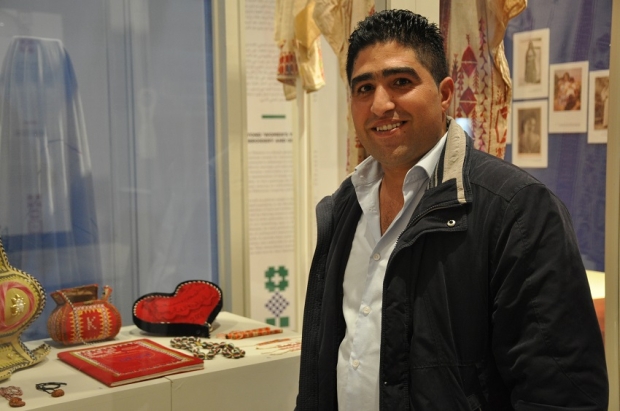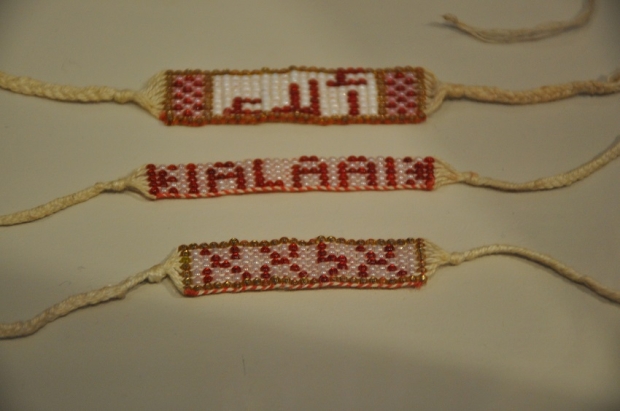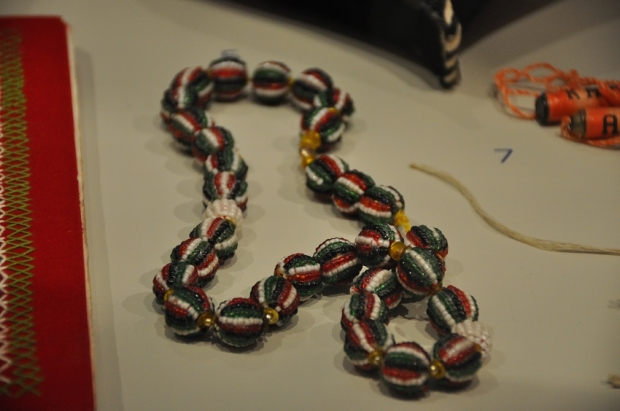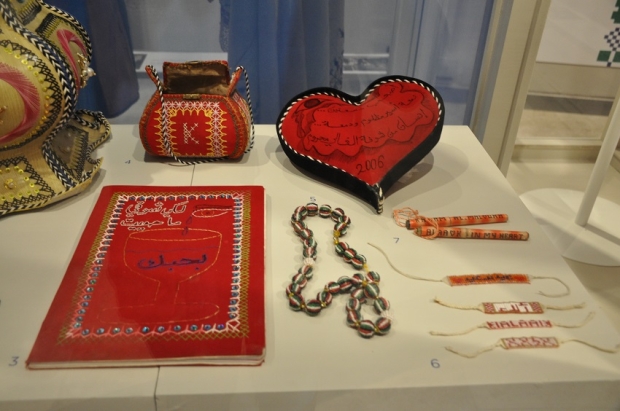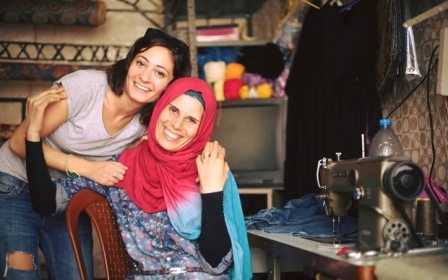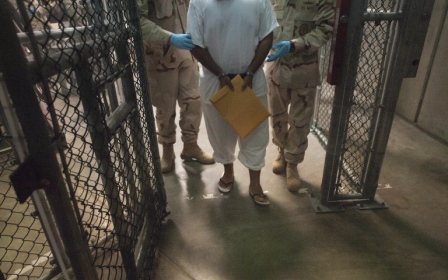Palestinian prisoners' craft of love: 'Embroidery is not just for women'
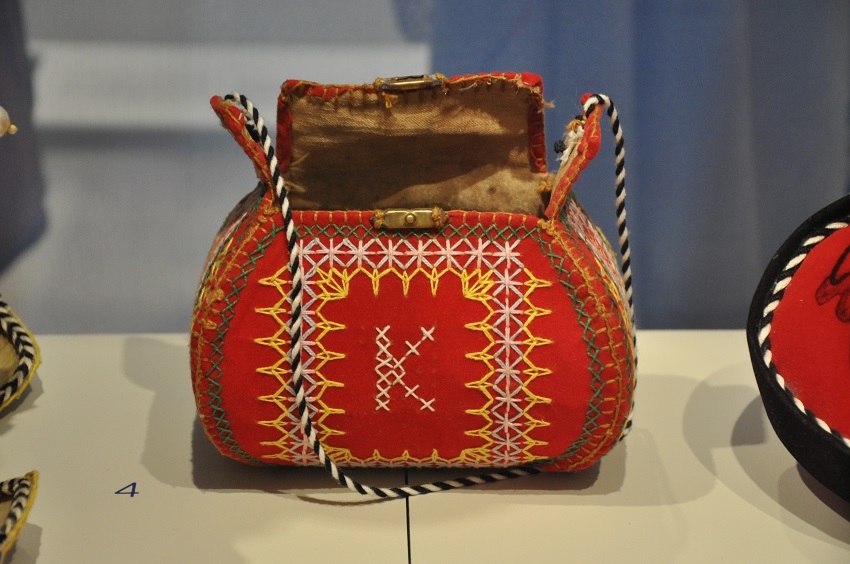
RAMALLAH, West Bank – After finding himself in an Israeli jail at the age of 17, Karam Maloukh picked up a skill that he might have never gained if he hadn't been imprisoned.
During his three years behind bars, the curious Palestinian teen learned the language of threads, beads and embroidery.
While the pastime of stitching and embroidery is traditionally associated in the region with women, Maloukh, who was incarcerated between 2004 and 2007, discovered a common practice he did not expect to find in a cell full of men.
"There was a man who was imprisoned with me on the same night. We were staying in tents at Ofer prison. He was imprisoned several times before and had experience in embroidery. He started to unravel threads from the tent and began to braid bracelets," recalls Maloukh, now 31, as he sits in the garden of a museum where his work is on display and where he is employed as a security guard.
"I started copying him and learned how to make bracelets," he tells Middle East Eye at the Palestinian Museum in Birzeit, a town north of Ramallah in the occupied West Bank.
He started to unravel threads from the tent and began to braid bracelets
- Karam Maloukh, former prisoner
"It was like walking into a factory," he remembers the amazement he felt, describing the cardboard templates for bags, the Dome of the Rock in Jerusalem and the map of Palestine. The templates were cut to the correct dimensions for making the gift of their choice.
While many of the materials were brought in by families during visits and through the Red Cross at the time, the Israeli Prison Authorities have all but completely stopped such items from entering certain prisons, making it increasingly difficult for prisoners to engage in the practice.
According to the Palestinian prisoner rights group Addameer, there was no specific decision to ban crafts materials; but prison authorities gradually began to limit the entry of crafts materials from the mid-1990s - particularly following the al-Aqsa Intifada, or uprising, in 2000 against the Israeli occupation, when many Palestinian men were arrested.
Maloukh, now a father of two boys and a girl, says: "I learned how to embroider, use beads, stitch on pens, and make prayer beads using the seeds of olives, and necklaces from avocado seeds."
While in prison, he made books, purses and bracelets for his fiancee. His work is currently being shown at the Palestinian Museum's Labour of Love exhibition until the end of January.
The exhibition examines aspects of Palestinian embroidery through themes such as gender and class, offering alternative perspectives to the importance of the practice in history and culture. On display is a highly informative and visually striking variety of dresses, accessories, posters, paintings and videos.
Uplifting one another
"Embroidery is not just for women," says Maloukh, with a smile on his face.
I learned how to embroider, use beads, stitch on pens, and make prayer beads using the seeds of olives, and necklaces from avocado seeds
- Karam Maloukh, former prisoner
Not only did the hobby require fine motor skills, it also demanded creativity in finding unconventional materials to produce the artwork of their choice, due to the lack of craft materials.
Rachel Dedman, the independent Beirut-based curator of the exhibition, said she discovered through her four years of research for the project that the feeling of "embarrassment dissolves, and men embroider with pride" in prison.
"When I asked the women we interviewed about it, they would often tell me their husbands and sons enjoyed embroidery, but that they would never talk about it in public," she says.
"In the indisputably masculine space of the prison, embroidery became a licit practice, done to counter boredom, to resist their incarceration, and to make gifts for loved ones," Dedman adds.
According to Maloukh, there was a positive effect not only for the prisoners that engaged in the creative endeavour but also for those who would ask to have something made for them.
"We would sometimes bring in cigarettes, and those who didn't smoke would trade a packet of cigarettes for a gift.
"The things we made uplifted our families," he says.
'Not a right'
The situation today, however, is markedly different because the extra-curricular activity is on a path to becoming obsolete.
People would ask me, 'Aren't you shy to do this kind of work?'
- Karam Maloukh, former prisoner
"The practice was much more widespread than it is today. There wasn't a clear decision banning the entry of materials, but the prison authorities started to view the activity as being a form of special treatment and not a right of the prisoners," said Ghazawneh.
She said that Addameer, which has lawyers that regularly visit the prisons, "used to receive many creative gifts" but that it has become "very rare these days".
Hatem al-Araj, whose work is also on display at the Palestinian Museum, was imprisoned in 2003 when he was 18, and he remains behind bars.
His mother, Nawal, says her son has not been able to gift her anything for years.
"They used to let in velvet, silk and beads. Now they [prison authorities] barely let them produce anything," she tells Middle East Eye from the town of Walajeh, northwest of Bethlehem in the occupied West Bank.
The gifts made for family members hold significant emotional value for recipients by giving a sense of closeness to their loved ones.
"The pieces he made mean everything to me. I wouldn't trade them for all the world's money," Nawal says. "I loved them because I could smell the scent of his skin on the gifts.
"It was very personal."
This article is available in French on Middle East Eye French edition.
New MEE newsletter: Jerusalem Dispatch
Sign up to get the latest insights and analysis on Israel-Palestine, alongside Turkey Unpacked and other MEE newsletters
Middle East Eye delivers independent and unrivalled coverage and analysis of the Middle East, North Africa and beyond. To learn more about republishing this content and the associated fees, please fill out this form. More about MEE can be found here.


